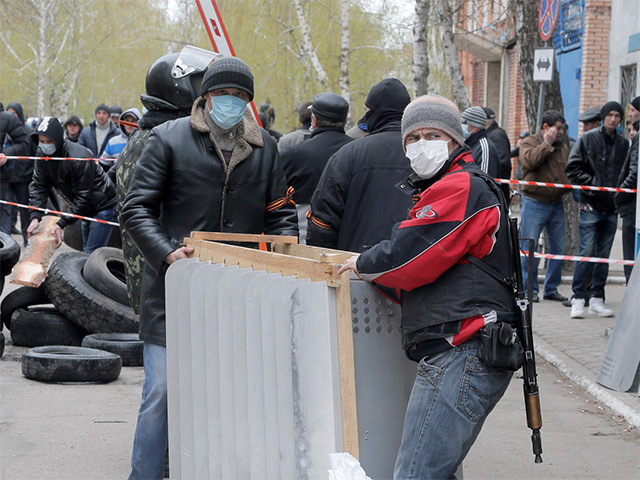
Brent crude advanced for the first time in three days and West Texas Intermediate extended gains as tension escalated between Ukraine and Russia, fanning concern that energy supplies in Europe may be disrupted.
Futures rose as much as 0.7 percent in London. Russia called for an emergency meeting of the United Nations Security Council after Ukrainian security forces clashed with pro-Russian gunmen in the eastern town of Slovyansk.
Libya’s prime minister resigned while the nation, a member of the Organization of Petroleum Exporting Countries, sought to restore oil shipments.
“The major contributor to the firm tone we’re seeing in the market is further concerns about Ukraine,” said Michael McCarthy, a chief strategist at CMC Markets in Sydney who predicts investors may sell contracts if Brent climbs to $109.50 a barrel. “Tensions are ramping up again. There’s still a bit of upside from a technical point of view before we hit significant resistance.”
Brent for May settlement gained as much as 78 cents to $108.11 a barrel on the London-based ICE Futures Europe exchange. The contract, which expires tomorrow, rose 0.6 percent last week. The more-active June future was 73 cents higher at $108.13 at 3:55 p.m. Seoul time.
WTI for May delivery increased as much as 60 cents, or 0.6 percent, to $104.34 a barrel in electronic trading on the New York Mercantile Exchange. It’s poised for the highest close in six weeks. The U.S. benchmark grade was at a discount of $3.81 to Brent. The spread was at $3.59 on April 11, the narrowest since September.
Camouflaged gunmen fired on government forces near Slovyansk, about 240 kilometers (150 miles) from the Russian frontier, Ukrainian Interior Minister Arsen Avakov said. “Henchmen” of the government in Kiev are organizing attacks with the backing of Western nations, Russia’s Ambassador to the United Nations Vitaly Churkin said at an emergency session of the Security Council in New York.
Russia is the world’s biggest energy exporter. A halt of the country’s crude and natural gas supplies through Ukraine “could be hugely impactful,” according to Ed Morse, the head of commodities research at Citigroup Inc. Any sanctions on Russia’s energy industry by the West would cause prices to “spike much higher,” he said in a report today.
In Libya, Prime Minister Abdullah Theni said he resigned because he didn’t want his candidacy to be the cause of violence. Theni and his family were attacked in a residential neighborhood on April 12, he said in a letter to parliament.
Libya’s state-run National Oil Corp. lifted force majeure on the Hariga terminal on April 10. The facility is one of four ports seized last year by rebels seeking self-rule in the east of the country, the holder of Africa’s largest crude reserves.
Brent may extend gains as it advances above the 30-day middle Bollinger Band, data compiled by Bloomberg show. Futures climbed to as high as the upper Band after a similar pattern in February. The upper Band is at about $109.40 a barrel today.
Hedge funds and other money managers boosted net-long positions on WTI by 10 percent to 331,056 futures and options in the week ended April 8, according to the U.S. Commodity Futures Trading Commission. Bets on rising prices were at the highest level for this time of year since 2006, the Washington-based regulator said in its weekly report.
Recommended for you
